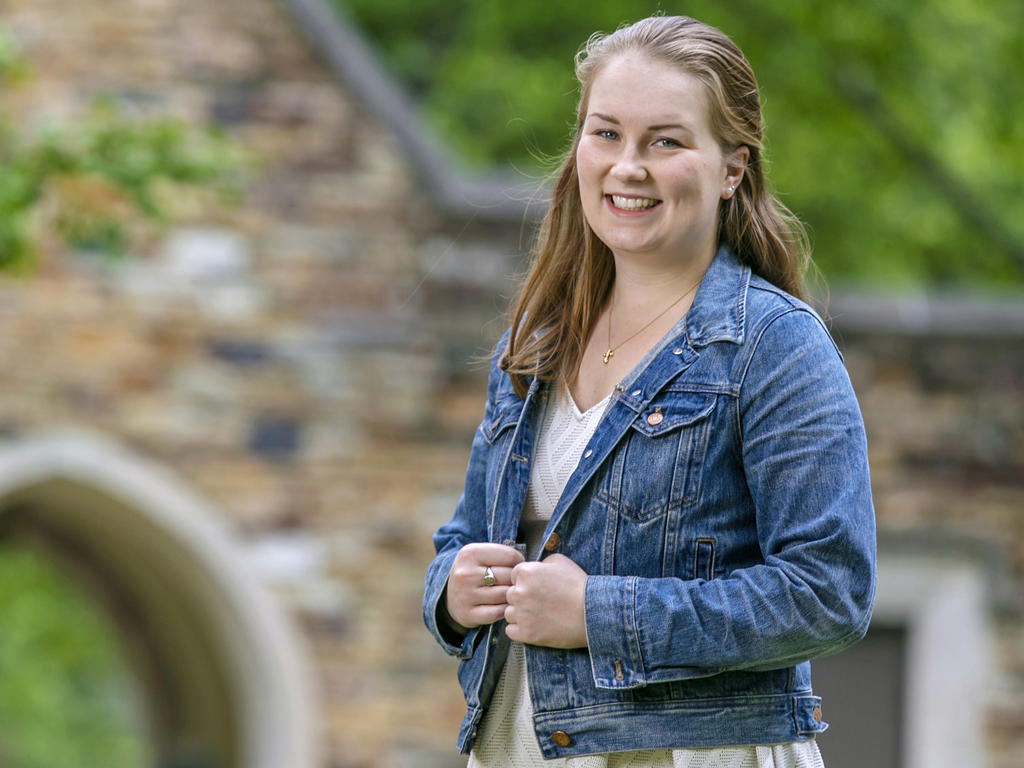When Maddie Alagia ’17 was considering places to attend college, she focused her search in the New England area, like most of her peers from the Washington, D.C., area. But Rhodes attracted her attention, and she eventually toured campus, met professors, and was even offered a spot on the swim team. A guiding factor in Alagia’s college choice was the opportunity to study in academic departments with highly skilled, yet highly accessible, professors.
Now about to graduate, the political science major and international studies minor says it was unique to have such well-regarded professors who still cared about her as an individual student. She recalls professors who have books that are referenced in college classrooms across the country, and whose offices she could drop into with questions about her academics or about her personal life. “One thing that I love about both departments is the professors’ willingness to work with students. You’re able to develop relationships with them and they get to know you on a one-on-one level. They become invested in your success.” says Alagia.
In order to get to know Memphis better and to harness the skills she’d been learning in her classes, Alagia decided to work in the city’s mayoral campaign in 2015. “I loved Memphis when I visited Rhodes, but I knew that it was so different from what I had at home. When I worked on the mayor’s re-election campaign I got to go all over Memphis, which was really cool for me because I got to know people from many different parts of the city that I don’t know if I ordinarily would have known,” says Alagia. “It was my first time working on a campaign, and it was a great experience. Ever since then I’ve wanted to get out into Memphis more.”
Alagia’s off-campus experience not only reinforced things she’d been learning in her political science classes, but gave her the desire to find more hands-on opportunities that would challenge her academically and give her experience working in the political field. This, and a desire to travel, inspired Alagia to find a unique study abroad experience. “I have family in the Middle East, so I grew up with the desire to travel ingrained in me. I also knew that deciding to study abroad was something that would combine my major and minor very well,” Alagia explains.
Alagia found a unique program that allowed her to take five weeks of classes in Scottish politics and culture and then spend the next 10 weeks interning in the Scottish Parliament. During the time she interned in Parliament, she worked on a research paper with help from a Member of the Scottish Parliament (MSP). Alagia notes that this research is something the MSPs often use after the interns leave, making the work all the more important. “My MSP had been nominated for a Nobel Peace Prize for his work with nuclear disarmament, so I ended up researching the health effects associated with nuclear weapons,” Alagia says. Because the Scottish Parliament has smaller offices than interns might find in the U.S. Senate, Alagia lauds the program for allowing her to work on a one-on-one basis with her designated MSP, which to her was reminiscent of the mentor relationships she has with her Rhodes professors. “I felt that my MSP had a vested interest in my future and how I was doing in Scotland,” says Alagia.
Alagia knew that she wanted to continue working in politics when she returned from Scotland, so she searched for a summer internship while she was still abroad. Though Alagia says it’s not easy finding a position while living in a different country, she found an opportunity working for the Global Strategies Group (GSG) in New York City. Working for GSG, which is a political affairs and communications team, allowed her to shift from working with an international studies mindset to harnessing her political science knowledge, as well as expand upon her communications and public affairs skills.
After graduation, Alagia will be working for a gubernatorial campaign in Virginia. For the future, she plans to attend law school in D.C. and eventually have a career in the field of politics.
By Katherine Hancock ’19
